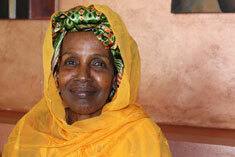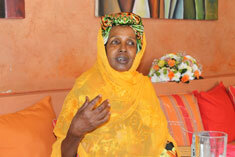Somali woman transforms refugees'' lives in Ugandan camp
FEATURE: Halima Ainte was born in Somalia, got married at 19, lost her husband of 12 children and eventually fled to and settled in a Ugandan camp in 2006.
By John Agaba
You would expect a woman whose all life has been a struggle—bearing 12 children, watching her country thrown up into turmoil and her man die before finally running away to stay in a refugee camp—to look gawky, tired, and helpless.
But Halima Ali Ainte is no such woman. Being Uganda’s Refugee Woman of the Year, she looks very alive.
With a veil over her head, Somali-born refugee looks you straight in the eyes. And when she speaks, her voice is firm. She’s not afraid. Maybe she’s been through a lot to be scared anymore as if living by the saying, ‘what doesn’t kill you makes you stronger’.
Ainte entered Uganda as a refugee from Mogadishu, Somalia in 2006. She enrolled at the Nakivale refugee camp in Rwampara, Isingiro, western Uganda. Soon, she would be that woman to mother-chaperon other refugees.
Because she spoke fluent English, it was easy for her to address challenges of other refugees, mainly Somali women who needed help about this, and about the other.
Now Ainte is Uganda’s Refugee Woman of the Year, courtesy of the Finnish Refugee Council in partnership with UNHCR and the Office of the Prime Minister (OPM).
Comfortable childhood, tragic marriage
Born in the suburbs of Mogadishu, Somalia, in 1953 to a clan elder, Ainte’s childhood was gratifying—at least she does not recall running around the villages hungry.
She was that kid that listened and looked up to her parents: “Dad was a good man. Mum too was a good woman. The two never divorced, they never had any sort of conflict between them, ’’ she calmly remembers.
She would grow up to be like them. That was her dream. And she almost lived it [her dream] when as a 19-year-old, she got married. But, like fate would have it, her ‘good life’ wasn’t to last forever. Her country got into an endless terror inflicting conflict that would halt everything she had believed in.
In 1991, her man died.
“My husband left me about 5pm in the afternoon. They brought him to me the next day—he was dying. They had shot him. He had bullet wounds all over his chest area. I looked at him, and I couldn’t save him.
“When he died, I knew I had to be strong and not cry. What would my children feel if they saw me crying? Though it hurt, really badly, I had to put on a face, and not cry,’’ she recollects with ease.
Darker times, desperate and helpless
Ainte and the 12 children her man had left her would see the chaos escalate, their country thrown up in fire.
“By this time, internal conflicts were the order of the day. Clans were up against clans. Government up against rebels. Islamist militias up against war lords. It was a dark moment,’’ Ainte says.
From then on, Ainte’s family that at one time had been a model family for many, would struggle to survive in the war torn region and ultimately disintegrate.
“Everything we had was looted. We became poor and empty, with nothing but the sun over our heads. It was really bad. Some of the older children joined the war. And when we couldn’t take it anymore we ran away. By the way, at the time, al-Shabaab wasn’t there.’’
They left their home village and furthered deeper into Mogadishu. However, even there, it was a related story—more like the case of jumping from the frying pan into the fire.
It was there in Mogadishu that they would witness humankind at his cruelest.
“Everything was strange. No one slept indoors. You sleep indoors, unless you wanted to be attacked in your sleep. People locked their houses at dusk and slept outside.
“It was terrible. What would you say of people that meet a girl, a young girl, rape her and shoot her in the genitals? People who meet a man with her 10-year-old daughter and ask him to give them his daughter so they sleep with her, in his presence? What would you say of them? Very bad! And this is a Muslim country we are talking about,” Ainte’s painful voice gives her away.
En route to an unfamiliar land
April 15, 2006 would see the woman leave Somalia—her homeland—for Uganda, and not with any of her children. Her last three borns, she left in the care of her sister back in Mogadishu.
By road, she got into Kenya and finally Kampala. But, still, she was afraid.
“Somehow I felt insecure, like in Uganda too, I would meet people that would want to rape me. Plus, this was a new country I was in. I didn’t know anyone. And I didn’t have a passport. Not even money.
“Then I was sick. As if the whole of my left side wasn’t working, if, like someone stood beside me but on the left and said something, I couldn’t get what they said, let alone feel them.’’
However, like fate was to have it again, Ainte met a man—Muhammad—who would advise her to join Nakivale refugee camp. Following the man’s advice, she got onto a bus again for the camp.
Starts life in camp
At first, Ainte says, she couldn’t believe her fortune or misfortune that she was in a refugee camp.
“All my life I had never been in a camp. Back in Somalia, I lived a good life: I drove my own car, and as a child had even travelled in Italy. Yes, also I had run from place to another, away from the missiles of the fighting military men. But, I had never been in a camp.
The camp was small. Then it had funny small sand houses with plastic roofing; its toilets were not good.’’
But Ainte knew better than complain. And the faster she adapted to her new life, the better. She would let Lukia, a woman refugee from Congo help her with a place to stay.
But then her sickness was worsening by the day. She went to UNHCR who attended to her. And soon after, Ainte would be that revelation that the camp had long needed.
Because she knew English, the UNHCR staff asked her to help with other refugees, a role she has ardently pursued to-date that she has even been named 2012’s Refugee Woman of the Year.
A hardworker, a volunteer, a leader
“Halima Ali Ainte was awarded the Refugee Woman of the Year because of her devoted work to help other refugees,’’ said Dr. Mari Maasilta of the Finnish Refugee Council.
“Thanks to her fluent English, Halima volunteers to help fellow Somalis in hospitals and offices. Also, she helps sexual and gender based violence victims by counseling or guiding them to the right authorities.’’
Also, she is the woman representative of her basement camp III and the chairperson of the persons with specific needs and works as team leader in the peace group of her camp.
According to one Congolese refugee [name withheld] in spite of her own difficulties, Ainte is an outstanding example of how refugee women can work together to make their lives better.
“Halima helps in facilitating fellow community members to build peace between refugees from different communities. She tells us that when we meet here, in a camp, we are people with a similar challenge. So the best thing for us is that we become friends.’’
Ainte says: “If I see a Congolese and Somali boy fight, I contact their mothers and ask them to calm the boys. We have to be alert and help our children heal their wounds when they aren’t too deep.’’
Nakivale camp accommodates about 40.000 refugees—people from Burundi, Rwanda, Congo, Eritrea, Somalia, Kenya, Ethiopia, Sudan, and even Liberia.
Six years down the road . . .
It is now six years since Ainte first entered the camp. But, at times, the mother of 12 concedes she feels like running away to find her children—ever since she left Somalia she has never heard about them or any of her family. All she believes is that they are alive somewhere in Somalia.
“Yes, inside the camp we have a good life. We have the freedom to do what we want. And people fear getting into wrong, which creates peace. But then, that’s not all. At times, you feel desperate, like you are caged in a prison. You feel like you are missing something and you want to go find it.
“I feel like going back. But then I know it is not safe. In Somalia today, you either join the government forces, or the Islamists, or the al-Shabaab, otherwise you will be killed.”
Ainte thanks the Uganda government and President Yoweri Museveni for the peace refugees are having.
“Uganda is a beautiful country. We just pray to God that the peace we have lasts because every other day we have new refugees coming into the camp,’’ she says.
Somalia has been at war since 1990.